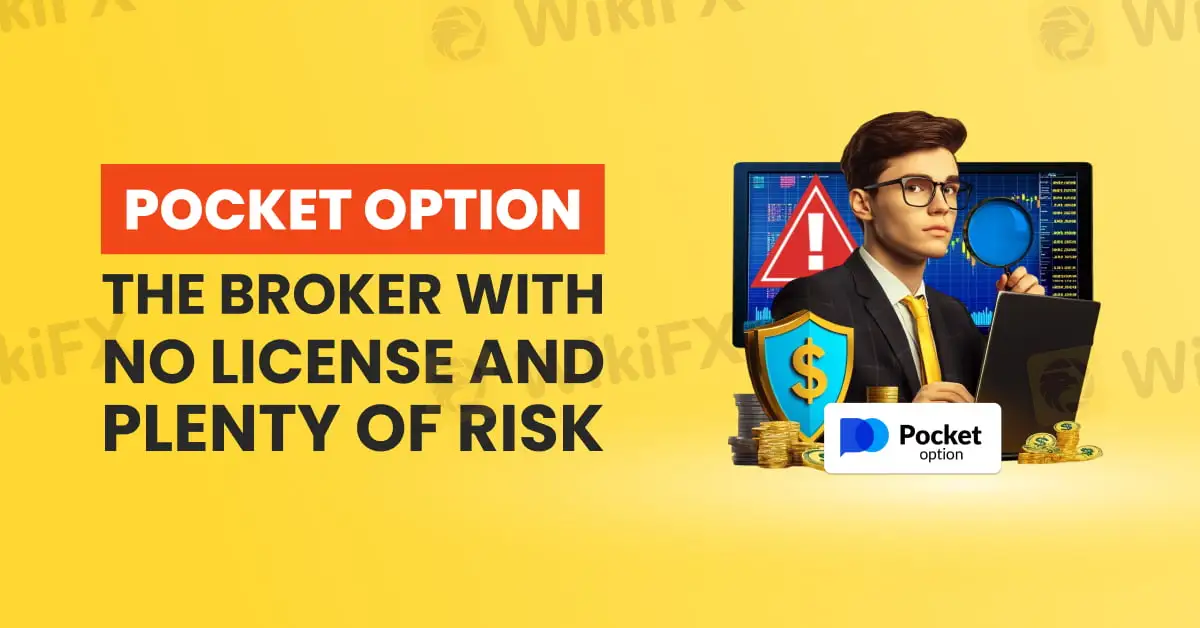简体中文
繁體中文
English
Pусский
日本語
ภาษาไทย
Tiếng Việt
Bahasa Indonesia
Español
हिन्दी
Filippiiniläinen
Français
Deutsch
Português
Türkçe
한국어
العربية
Pocket Option: The Broker With No License and Plenty of Risk
Abstract:No regulation. No oversight. No safety net. Pocket Option is a trap too many traders walk into, only to lose their funds with no way back.

If you are trading with Pocket Option, or even just considering it, take this as a serious warning. You may be exposing yourself to massive financial risk. This is not just another questionable broker. It is one with no valid regulation, an official warning issued against it, and a WikiScore of just 1.56 out of 10, according to WikiFX, a global broker evaluation platform.

The consequences of using such a broker are more severe than most traders realize. Here is why.
Pocket Option currently holds no valid license from any recognized financial authority. In the world of online trading, this is a critical red flag. Regulated brokers are required to follow strict rules to protect their clients. These include keeping customer funds separate from company funds, undergoing regular audits, and maintaining capital requirements.


Unregulated brokers are not held to these standards. That means they can:
- Control and manipulate trade prices without detection
- Refuse withdrawal requests without justification
- Lock or delete user accounts without recourse
- Disappear completely with client funds
If any of these things happen, there is no governing body to help you. There is no legal recourse, no financial authority to turn to, and no official investigation that can be launched on your behalf.
Pocket Option has also been publicly disclosed by the Securities Commission of Malaysia. Such actions are only taken when there are serious concerns about a broker's legal standing or business practices. This means the broker may be offering services illegally or misleading investors in ways that violate local laws.

For any trader, this is a strong signal that this broker operates in an unsafe and potentially unlawful environment.
On WikiFX, Pocket Option has been given a score of just 1.56 out of 10. This rating is based on factors such as regulation, transparency, safety, and business operations. A score this low reflects deep problems that put client funds and personal data at serious risk.
It suggests that the broker is lacking not just in legal structure, but also in operational standards, trading environment, and risk management.
If you are using an unregulated broker, you are putting your money into a system with no safety measures and no oversight. This is not responsible trading. It is a one-sided risk that you are almost certain to lose.
Pocket Option may appear to offer opportunity. But there is no legal protection, no customer support accountability, and no regulator watching their actions. That means no refunds, no investigations, and no justice if something goes wrong.
With so many regulated brokers available that offer proper investor protection, transparent terms, and legal compliance, there is no reason to put your trust in a company like Pocket Option.
Always check a brokers license. Verify their regulatory status. And remember, if a broker is not regulated, your funds are not safe.

Disclaimer:
The views in this article only represent the author's personal views, and do not constitute investment advice on this platform. This platform does not guarantee the accuracy, completeness and timeliness of the information in the article, and will not be liable for any loss caused by the use of or reliance on the information in the article.
Read more

Investing Capital in Focus as Complaints on Withdrawal and Other Issues Mount
Explore this guide we have exposed Investing Capital, which has mounted concerns for traders by disallowing withdrawals and making them lose their hard-earned money.

4 Warning Signs That Indicate You May Get Scammed in Your Forex Investments
In this blog, we will share with you a guide telling you about the tactics fraudsters employ to dupe investors.

Global Brokers Vs. Indian Rules: Why They Struggle in India
RBI issued a warning last year against 75 forex brokers. Those brokers are globally popular and regulated in other countries, but they are banned in India. Only few brokers even have physical offices located in India. So, why do global brokers face so many challenges in entering the Indian market?

Aetos: A Closer Look at Its Licenses
With multiple regulatory entries and one license now revoked, Aetos stands as a broker requiring closer scrutiny from investors, particularly those prioritizing license scope and jurisdictional compliance.
WikiFX Broker
Latest News
Tokenized Stocks: Innovation or Just Another Wrapper?
Gold Rush Again: What's Driving the Bullion Market Crazy Ahead of US Jobs Data?
XTB Launches Tax-Advantaged Retirement Accounts in Poland
Zaffex Broker Review
ECB Ends Easing Cycle, But The Eurozone Crisis Is Just Beginning
Amazon deploys its 1 millionth robot in a sign of more job automation
MT4 and MT5 Platforms - Helping Traders Up Their Forex Trading Game
A bare-bones deal is Europe's best hope in trade talks with the U.S., sources say
10-year Treasury yield remains higher despite weak ADP jobs report
Blueberry Markets Revamps its Website
Currency Calculator


